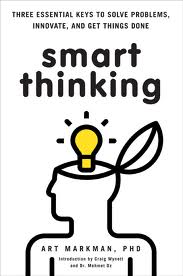Is There a Formula for Smart Thinking?
 One day, one of my kids was staring at a simple circuit diagram. It showed a battery connected to a resistor and a light bulb. He was doing a homework problem. The particular question that had him stumped asked what would happen to the current in the circuit if the resistor was replaced with another that had more resistance. He hadn’t been in class that day and had never studied electricity, and so he stared at the diagram for a few minutes without comprehension.
One day, one of my kids was staring at a simple circuit diagram. It showed a battery connected to a resistor and a light bulb. He was doing a homework problem. The particular question that had him stumped asked what would happen to the current in the circuit if the resistor was replaced with another that had more resistance. He hadn’t been in class that day and had never studied electricity, and so he stared at the diagram for a few minutes without comprehension.
My son had reached what psychologists call an impasse, which is really just a fancy way of saying that he was stuck. One of keys to good problem solving is to deal successfully with impasses. My son was not being successful. He sat sullenly at the table and his eyes started to glaze over. As luck would have it, I did know the answer to this question, because I had gotten a ham radio license as a kid and so I had to study some electrical theory. But, as a parent, I don’t like to give my kids the answers, so I put on my best Socrates impression and went to work with him.
I asked him to describe the problem to me, but all he was able to do was to read it back to me almost word-for-word. I asked him what else he knew about electricity. He described to me how the electrons in a circuit flow from the negative part of the battery through the circuit to the positive part. I asked him what resistors did, and he said that they made it harder for the electrons to move through the circuit.
So, then I asked him if he knew anything else that flowed. He thought for a moment and then said that water flows. I told him to think about water flowing through a hose. I asked him to think about what it would be like for a water hose to have a resistor on it. He thought of bending the hose as he and his brothers sometimes do when I’m trying to water the plants or wash the car. He quickly realized that making the resistor bigger was like putting more of a bend in the hose, and so the flow of water would go down as the resistance went up. The frustration evaporated, and he went back to work. He solved the rest of the problems on the page by thinking about water hoses rather than electrical circuits.
In his own way, my son was doing the same thing that James Dyson did. He was using his existing knowledge to help him solve a new problem. Like Dyson, he was using knowledge that came from a different realm of expertise.
This example highlights two of the key elements of the general formula for smart thinking. It is crucial to have high quality knowledge and to find that knowledge when you need it. My son reached an impasse, because he could not find any knowledge that he had that was related to the problem. By suggesting ways to re-describe the problem, I helped him to think of water flowing through a hose. Because he understood the way that water flow is affected by putting a kink in the hose, he was able to learn something new about the effects of resistance on an electrical current.
In this case, he was not able to access the knowledge he needed on his own. He had to have someone else’s help to enable him to move forward with the problem. In general, an impasse feels so frustrating, because you don’t know what to do next. That feeling of being stuck makes you anxious. Getting anxious and stressed when trying to solve a problem is not usually a recipe for successful thinking.
Problem solving can be stressful in part because you have a lot of mental habits that you have generated through years of practice thinking. Unfortunately, not all of those mental habits are conducive to smart thinking.
 The thinking habits you have are not part of some fixed mental toolkit that you were born with. Those habits were created by going to school for years and then they were reinforced by all of the thinking you have done since then. Smarter thinking requires developing new habits to complement the ones that have already brought you success. It also requires changing habits that are getting in the way of smart thinking. When you reach an impasse, you need to have habits that allow you to do for yourself what I helped my son to do. You have to develop habits to create high quality knowledge and habits to help you find it when you need it.
The thinking habits you have are not part of some fixed mental toolkit that you were born with. Those habits were created by going to school for years and then they were reinforced by all of the thinking you have done since then. Smarter thinking requires developing new habits to complement the ones that have already brought you success. It also requires changing habits that are getting in the way of smart thinking. When you reach an impasse, you need to have habits that allow you to do for yourself what I helped my son to do. You have to develop habits to create high quality knowledge and habits to help you find it when you need it.
If we distill the examples of Dyson, Fairhurst, Edison, chess experts, and even my son, we get the formula for Smart Thinking:
Smart Thinking requires developing Smart Habits to acquire High Quality Knowledge, and to Apply Your Knowledge to achieve your goals.
 - This is an Excerpt from Smart Thinking (Perigee Books ©2012 Arthur B. Markman used with permission). Art Markman, PhD is a professor of Psychology and marketing at the University of Texas at Austin and director of the program in the Human Dimensions of Organizations. He has written over 125 scientific papers. He blogs regularly for Psychology Today, Huffington Post, and Harvard Business Review, and teaches executive education classes via his consulting company Maximizing Mind, LLC.
- This is an Excerpt from Smart Thinking (Perigee Books ©2012 Arthur B. Markman used with permission). Art Markman, PhD is a professor of Psychology and marketing at the University of Texas at Austin and director of the program in the Human Dimensions of Organizations. He has written over 125 scientific papers. He blogs regularly for Psychology Today, Huffington Post, and Harvard Business Review, and teaches executive education classes via his consulting company Maximizing Mind, LLC.


